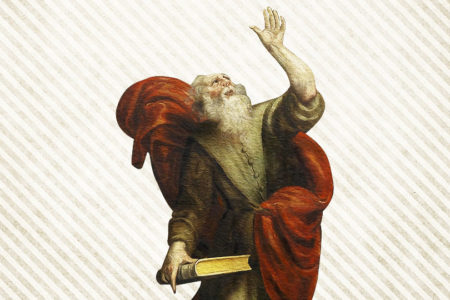Q: Who are the “sons of God” in Genesis 6:2?
“Now it came to pass, when men began to multiply on the face of the earth, and daughters were born to them, that the sons of God saw the daughters of men, that they were beautiful; and they took wives for themselves of all whom they chose” (vv. 1–2).
Surprisingly, the phrase sons of God appears solely in reference to angels. Many people reject this interpretation because it would mean angels had sexual relations with humans—something abnormal and grotesque; and the offspring would be part angel, part human.
Others say the phrase refers to the godly line of Seth marrying the godless line of Cain (4:16—5:32). Still others believe the phrase refers to men (not angels) who were giants, mighty men, and men of renown (6:4). Thus they believe humans, not angels, married these women (v. 2).
However, there are good reasons to accept the view that the sons of God were fallen angels (demons) who “did not keep their proper domain”; left their habitation in heaven; followed Satan; against their nature, interbred with women; and are now chained “under darkness for the judgment of the great day” (Jude 6).
1. The union produced a breed of humans whose offspring were “giants” (nephilim, Hebrew for “fallen ones,” not “giants”); “mighty men” (warriors of superior intellectual and physical ability); and men of “renown” (fame, prestige, distinction, and notability; Gen. 6:4).
2. The term sons of God in Jewish Scripture (Job 1:6; 2:1; 38:7) always refers to angels.
3. The context of Genesis 6:1–4 seems to be the major reason God destroyed all of humanity with a universal flood, except for the people inside Noah’s ark.
4. When Jesus referred to angels in Matthew 22:30, He was speaking of those in heaven, not of angels in general.
5. The angels who appeared to Abraham had physical, male bodies. They ate, touched things, washed their feet and hands, and were identified as men by the men in Sodom and Gomorrah (Gen. 18—19).
6. Literature and Jewish scholars and historians (Josephus and others) all maintained that Genesis 6 refers to fallen angels having relations with human women.
7. Early church leaders, such as Justin Martyr, Irenaeus, Tertullian, and others also held this position.
So it seems the sons of God were fallen angels who cohabited with human women and produced offspring with intellectual and physical abilities that gained fame in the antediluvian age.








These giants, men of renown are offspring of the fallen angels(naphal). And they are the heirs of the serpent (gen3:15). What we see in chapter 6 after that union, there is a vast change of not just size,but of in-humanity and wickedness(gen6:5) that ordinary human being may not know.
Quick question . Genesis 6 says there were giants before and after the “sons of God” married the “ daughters of men”. How do you place this in the context your suggestion that the giants were offspring’s of man and angels?
My impression from reading Luke 20:35,36 suggests there’s no procreation in Heaven.It appears no angels are given the capacity to procreate. I believe God in giving this ability to man to create life had created a new order of beings who are unique in that sense and hence image of Himself.
Angels are spirits and even if they take human form, my understanding is they don’t have that unique capacity given to men to procreate
Nancy, so much to dig into here. We are saved by grace not by works, your last paragraph is sadly mistaken. You are not good. I am not good. I cannot do anything to save myself or get to heaven. Only the blood of Christ has atoned for my rottenness. We are not equal to angels. We are just below them. YOU HAVE MADE HIM FOR A LITTLE WHILE LOWER THAN THE ANGELS; YOU HAVE CROWNED HIM WITH GLORY AND HONOR, AND HAVE APPOINTED HIM OVER THE WORKS OF YOUR HANDS . . . Hebrews 2:7 If you go back up and read, in the Hebrew, “sons of God” always refers to angels. The verbiage of this term in other scripture is not the same verbiage used, even though the modern writings changed it when it was translated. The angels here were fallen angels, because that is what Nephilim actually means in the Hebrew. It translates as fallen, not giants. These fallen angels already had carnal desires, so that is a moot point. The rest of your points all fall upon these being fallen angels.
May I put forth some thoughts?
1. There is no mention at all of “the sons of God” coming down from heaven.
2.Why assume these “sons of God” are angels? The phrase is used concerning men, especially those who know the true God. (Dt 14:1 (R.S.V.), HOS 1:10; Lk 3:38; Jn 1:12, 1 Jn 3:1
3. If believers are to be made equal to angels (Lk 20:35,36), will they still experience the same carnal desires which then motivated the sons of God, or have the possibility of giving way to them? Of course not!
4.Luke 20:35,36, clearly says that the angels do not marry, (some say well, maybe they do not, but perhaps they could), however, the penalty of sin is death. And the Angels were created in God’s image and character, and are spritual beings. If they were found quilty of marrying women then they have sinned and should have been killed. Man should not have been killed due to the works of a Fallen Angel. However, according to some, the were thrown into an Abyss until their Judgment. When men were killed immediately in the Old Testament for disobeying God right on the spot.
5. The Hebrew word for Giants in Genesis 6:4, is also used to describe the sons of a man called Anak in Numbers 13:33. Freak human beings of unusual size or strength are sometimes born today, but it does not mean that their parents were angels.
6.We are not specifically told that the giants were the children of the “Sons of God” There were giants and also after that the sons of God came in unto the daughters of men. And nothing more to tell us they were Angels.
7.If Angels married women, then who were the children, and what were they like? The book of 1 Enoch claims that the offspring were “evil spirits” and witches 15:8-16:1, but the Bible is utterly silent about this.
Our understanding is that the Son’s of God most likely are referred to having the true understanding of God and being steadfast. Many times God has referred to us as his sons and daughters.
Solomon went astray, David went astray, many good men in the Bible married non-believers which caused Yahweh great sadness.
In Closing Angels cannot sin. If they could they would be able to die. And Angels do not die and that is why when we are resurrected we will never die as well or go back to being how we were before, because we will be resurrected in a spiritual body and not a human body that is filled with sin and the reason we died to begin with.
If The Angels were able to leave Heaven and marry women, then what good is us going to Heaven where we have been promised by our creator, that we will have peace and that there will be no more tears or pain and suffering.
To be in a Heaven where we would have the capability to sin again is absurd. If it is true, then we are being resurrected to a world we just left.
All that we endured to be loyal to God would be for nothing. Our reward to live forever in Paradise would be a lie.
We worked hard to hopefully receive this award for being good, while others were bad. To have to go a Heaven that replicates our horrible world, allowing us to sin again would not only be unthinkable, but cruel.
I’m sorry did you say angels can’t sin? I believe the devil was once an angel who sinned and brought a whole score of angels with him. Also of angels don’t sin where do demons originate? If heavenly beings are unable to sin then the only thing we can say is certain part of the new testament are a lie. Jesus being tempted never happened. The constant warning of the devil completely useless. There is no real enemy other than sin. Whatever being was in the garden wasn’t. That’s faulty. Angels have the ability to sin. Angels have free will just not redemption. Angels cannot be destroyed because they are literally spiritual beings. They are a type of being that we will become. I do not mean that we will be angels but we certainly won’t be physically human anymore. We will be made into pure energy. As science tells us energy cannot be destroyed. Bible says they were put in chains of darkness. They were imprisoned away from the Presence of God. They sinned and will experience eternal death just all who are unfaithful. Hell is eternal death, eternal punishment. The place for the devil and his servants to have eternal suffering. Eternal separation from God. I’m not sure why you think angels cannot sin but they did it readily with Satan. The flood was a result of a purification of the human line. The nephilim introduced extreme depravity in man. The flood happened because man had departed so far away from what God has created that God had to soft reboot the earth. The view that Genesis 6 is not talking about angels but were in fact humans was not the view of this passage until about 5th century a.d. and was heavily leaned on by Augustus. Until then it was believed this was talking about angelic beings. Jude eludes to as much in his writing. Point is Angels or more appropriately heavenly beings could and more than likely can sin. God never created an entity in his likeness without it having free will. Before you say it never says angels are made in his image God is spirit. We don’t look like God we have a soul that’s what makes us his image. The spiritual beings that reside in the spiritual realm are point in fact spirit. Satan being a spiritual being chose to rebel. Now as to whether we can sin in heaven, I have no idea. That’s a question for Heaven.
If before the flood the angels cohabitated with women of the earth and the flood was in part the judgment for that act, (1) how would a flood destroy these angels? I can see how human women would die by drowning as one cause, but I cannot see where angels were affected by drowning or other causes of death. (2) Do angels die? (3) How did they become chained under darkness of judgment? (4) How do we know that God gave angels the ability to procreate and to what end? (5). Were angels given a command to be fruitful and multiply? (6). Could not God just create more angels if He needed more? (7) Is Satan permitted to procreate?
I have always wondered about the terms Son of man and Son of God. I would love to know more.
Nowhere in the Bible does it indicate that when the angels rebelled they lost their powers. Jesus said we would be like the angels in heaven after we receive our glorified bodies. Most people ignore those two words “in heaven.” From many Biblical accounts we know that angels manifest themselves to humans in physical bodies and also take on human function. Hence, they were able to procreate when they took on human form as part of satan’s plan to corrupt the human genome and prevent Messiah’s birth. No other explanation can explain the legendary mystical powers people in that age were said to have like the ability to levitate objects, etc. Comparing Scripture to Scripture angels are constantly referred to as “sons of God” in the general sense rather than in a procreative sense
Please don’t laugh at me. Does this mean angels are both male and female? Or all Angels male and have (or had) ability to procreate?
There are no reference to female Angels in the Bible. Jesus stated [Luke 20:35] that Angels do not marry, but did not elaborate. The passages discussed above do indicate some manner of procreation is possible. However, at least as practiced, it was unacceptable [see point 3 in the article above, along with 1 Corinthians 11:7-12 and Jude 6&7].